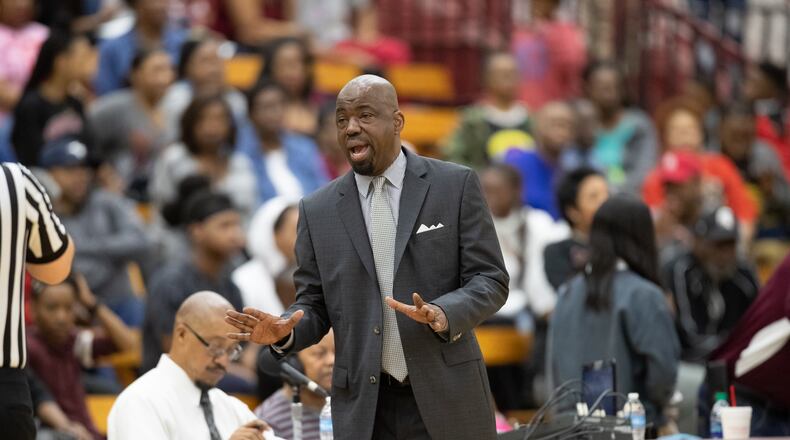More than most, Grady Brewer has experienced the arc of progress that his country has made in the realm of racial equality. The 62-year-old Morehouse basketball coach was born and reared in Atlanta, living through the latter stages of the civil rights movement. He counted as friends Martin Luther King III and Ralph David Abernathy III, sons of civil rights giants.
He grew up feeling the lash of racism. Among his childhood memories – his parents’ refusal to let him and his siblings watch movies at the Fox Theatre until seating was integrated in 1962. He remembers going downtown and seeing two sets of water fountains, one for white people and one for black people. It was a practice outlawed by the Civil Rights Act of 1964, but vestiges continued in following years.
He has a memory of being struck with fear as a young boy when he was subjected to racist epithets upon encountering a Ku Klux Klan rally on his way home from a Braves game to the Eagan Homes housing project. As a student at Douglass High, he recalled textbooks that were hand-me-downs from predominantly white high schools in the Atlanta Public Schools system.
At a time of social upheaval, as thousands in Atlanta and more nationwide protest police brutality and racial inequality after the death of George Floyd, Brewer is at once hopeful and frustrated.
“I know it’s going to get better,” Brewer told the AJC. “There’s always a storm before the calm, and so it’s going to get better.”
At the same time, he feels sadness for having to continue to teach the members of his Morehouse team and his three sons to put their hands on the steering wheel or out the window if they are stopped by police, and not to respond if they believe they’re being treated inappropriately. The deaths of black men such as Floyd at the hands of police only deepen his sorrow.
“It saddens me, because over the years – and a lot of people don’t want to admit it – but there has been a great advance in civil rights over the years,” he said. “But these types of things impact you.”
Brewer, who has been head coach at Morehouse for the past 20 seasons after 13 as an assistant to Maroon Tigers legend Arthur McAfee (whom Brewer played for), has his own story of being profiled by police. Brewer said that, in 1987, he and a close friend flew to Chicago to watch a Cubs-Dodgers game at Wrigley Field. On their way to the game, Brewer said, he and his friend were pulled over by police, who ordered them out of their rental car with guns drawn and told them to put their hands on the car.
His friend, Hubert Bell, said Thursday that he remembered being frisked and the car searched. Both men recalled that police told them that they suspected them of being drug dealers.
Said Bell, “That incident happened, and it wasn’t good. It was a sign of the times then. It’s surely a sign of the times now.”
In his time as head coach, Brewer said that team members at the HBCU school have come to him – he estimates perhaps once a year – to tell him of traffic stops where they believed they were mistreated because of their race.
“All the time,” Brewer said. “And these are great kids. Most of them have no issues in the past, and they are just frightened and afraid. They would come to me (and say), ‘I got stopped because I was in a nice car.’”
Brewer hopes that sharing those experiences can help create understanding and sympathy with people of all racial backgrounds.
“It’s traumatic,” he said. “I just don’t think a lot of people have the compassion and understanding that, it’s real tough when that type of situation happens, especially when you’ve got good kids who have not done any wrong.”
Brewer’s hope is that the young people who have demonstrated in protest of Floyd’s death will not be overtaken by their emotions, but to organize, devise a lawful strategy and then execute it. Voting should be at the heart of any plan, he said.
“That is what’s going to make the change, by changing the people that are up in the offices that you don’t want to be there,” Brewer said.
For the goal of racial justice, Brewer also advocated for slavery reparations, the idea of payment by the U.S. government to descendants of slaves to acknowledge the damages caused by slavery. A poll conducted in September by the Associated Press and the NORC Center for Public Affairs Research found that 74% of black Americans were in favor of reparations, while 15% of white Americans supported the idea.
Brewer believes that the idea at least deserves examination “because you can’t catch up 400 years of what they have done to African Americans in this country.”
Brewer can measure the progress of racial equality through three events that he personally witnessed on the same spot on Morehouse’s campus – the outdoor funeral service for the Rev. Martin Luther King Jr. in 1968, then-President Barack Obama’s commencement address in 2013 and the 2019 commencement speech of billionaire Robert Smith, when he announced he would pay off the $34 million of student debt of the entire graduating class.
Brewer’s parents were involved in the fight for civil rights and racial justice. He now passes the baton to his sons and players.
“Just the journey, I know that you can be successful if you have patience and you do the right things and you try to overcome hate with love,” he said. “I do know that.”
About the Author
Keep Reading
The Latest
Featured


